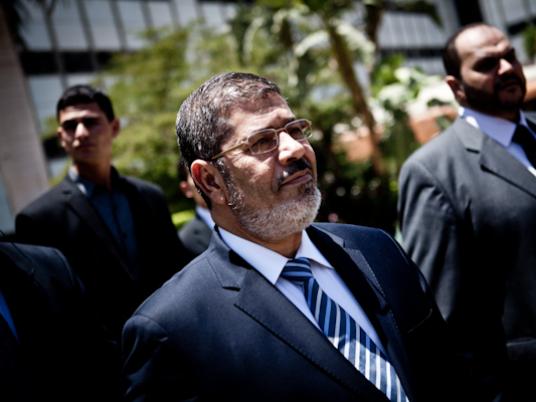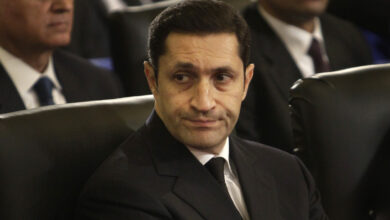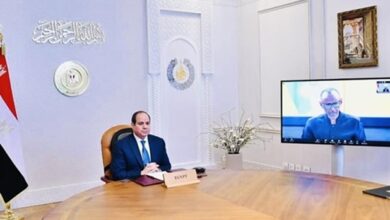
Outside the halls of the presidential palace, where newly elected President Mohamed Morsy is still getting settled, protesters are already out in force to remind him that, unless he meets certain demands, he will face constant demonstrations.
But inside the palace, Morsy will deal with another, less visible challenge: the presidency itself. The presidency is more than an office held by one person. It is an institution with a huge staff and protocols that evolved over the past 30 years to serve just one man — ousted President Hosni Mubarak. Now Morsy enters that office as an outsider.
The new president has to deal with some 600 members of Mubarak’s staff while trying to introduce his own personnel. Under Mubarak’s tenure, the presidential institution was one to which only those closest to his regime were allowed access. Many are skeptical as to whether Morsy will be able to incorporate members of the Muslim Brotherhood, whom Mubarak and his staff viewed with dread and disdain.
“It’s expected now for Muslim Brothers to be in the presidential palace, working,” said Ali Ahmed, a former administrative executive in Mubarak’s presidential office. “The new president has every right to appoint new staff. But its success and ability to work as a team with the existing staff is the challenge.”
The first signs of friction reportedly occurred during Morsy’s speech at Cairo University, after he took the oath of office. An unnamed source told the independent daily newspaper Al-Shorouk that old staff had the final say on the speech, after Morsy’s campaign team attempted to write it outright.
Similarly, the fact that the president has yet to appoint an official spokesperson and information officers, despite having run the election with a full public relations team, suggests that the integration of Morsy loyalists into the presidential office has been far from seamless. So far, his campaign manager and ambitious Brotherhood figure Yasser Ali has been his acting spokesperson.
Prior to Morsy’s victory, the Supreme Council of the Armed Forces appointed General Mo’men Fouda, a former military adviser to Mubarak, as head of the president’s financial affairs. This could be seen as an indication that the generals want to keep their men close to the new incumbent, and in positions of responsibility.
“This is expected. Change will not come overnight. The presidential office will not maintain good order unless it makes use of its experienced staff,” said Sherif Riyadh, a former secretary to the president’s chief of staff.
Ahmed agrees. For him, competence and familiarity with the job are just as important as political loyalty.
“Morsy needs to make sure he relies on the experienced members of the presidential office who are still in place,” he said.
Morsy has begun to move some of his personnel and representatives to work in the presidential palace, according to media reports, although he has not yet named his official staff. Ahmed said some current staff members think Morsy is looking to weed out anyone who might have shown excessive loyalty to Mubarak, and who therefore might not be reliable in the future.
What is the presidential office?
Before the revolution, no one knew exactly how the presidency was funded, or what its responsibilities were. People only knew it was Mubarak’s fortress, an opaque and unaccountable institution. Presidential representatives provided brief statements on political decisions, but its internal mechanisms were always shielded from the public eye.
The presidency comprises nine departments: general and private secretariats, a communications office, the presidential police, and departments dealing with security, supplies, transportation, palaces and fire hazards in presidential buildings.
The Central Auditing Organization, which should oversee all of these departments, only had access to 10 percent of it, said Ibrahim Yosry, an official from the organization and a founding member of Auditors Against Corruption. “The last real report accounting for the institution of the presidency was in 1987,” Yosry said.
This last report roughly coincided with the rise of Zakariya Azmy, who served as Mubarak’s chief of staff from 1989. Azmy ran the president’s office with an iron fist, pouring over and scrutinizing every detail.
“If anyone even took a picture within the presidential palace, he would have to review it, and if he didn’t like it, your career was over,” said a photographer for a state-run newspaper, who chose to remain anonymous.
Under Azmy, the presidency became one of the least transparent institutions in the country. He played a pivotal role in decision-making and supported the accession of Mubarak’s younger son, Gamal, to the presidency.
Azmy ended up in jail for seven years on corruption and illicit gains charges that were instigated after the revolution. The institution under Morsy will clearly be run very differently, simply because of Azmy’s absence. “The appearance of a new Azmy is impossible,” Riyadh said.
While Azmy ran the presidency in a way that made many people afraid of him, Riyadh predicted that Morsy will be experimenting with a different approach. “Many of the old presidential staff members will deal with Morsy from a professional perspective,” Riyadh said.
Cash, cars and cribs
When Mubarak assumed office in 1981, its allocation in the budget was reportedly LE14 million. That figure now stands at LE286 million, according to unofficial reports. His office officially controlled up to 36 palaces and rest houses, all of which had restricted access, according to official statements.
But the true figures behind the presidency are not so easy to figure out.
“The funding of the presidency was supplemented through a series of at least six private funds that kept the real figures out of everyone’s reach,” said economist Abdel Khalek Farouk, head of the Nile Center for Economic and Strategic Studies.
Private funds are unaudited accounts that are not incorporated into official budgets, and were associated with corruption during the Mubarak years. Under Article 20 of the laws governing the presidency, the president is allowed to establish as many private funds as he wants.
Walid al-Gohary, an official from the Central Auditing Organization, said a total of more than LE40 billion was spent on the presidency during the Mubarak era. CBC channel reported that under Mubarak, the office maintained 952 cars, 12 planes and three helicopters.
“If Morsy wants to show he’s serious about fighting corruption, he needs to issue a presidential decree to open up and reallocate the private funds,” Farouk said.
Farouk’s research has shown that, aside from the private funds, the presidency was bolstered by systematic embezzlement from public companies such as the Suez Canal.
“The budget of the presidency did not mean anything. If Azmy [or Mubarak] asked for anything, they got it. Money was not an issue — there was no ceiling for spending,” said Ahmed. This spending benefit also extended to Mubarak’s immediate family.
For Morsy to run the institution of the presidency in a way that honors his promises, he will have to change both the practices of the institution, and some of the people who will want to keep that change from happening.
Azmy is behind bars, but there are still 600 employees who are used to the luxury of living within the walls of Mubarak’s cash-rich fortress.
“The changes must be decisive and reach the core of the institution. This was one of the most corrupt institutions, and it helped the Mubarak presidency engage in unending corruption,” Farouk said. He added that an immediate change in the leadership of the presidential staff was important.
Since Mubarak was ousted last February, the presidential office has been stagnant. “People are just coming in and out without doing any work,” said Ahmed, who is in touch with former colleagues. “There is no real maintenance of the place.”
Now that Morsy is stepping in, it may be time to clean house.
This piece was originally published in Egypt Independent's weekly print edition.




